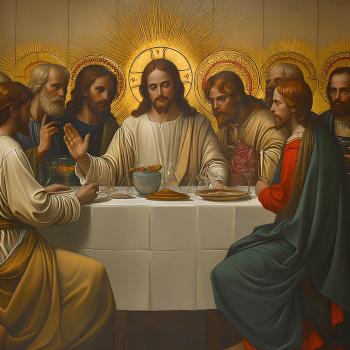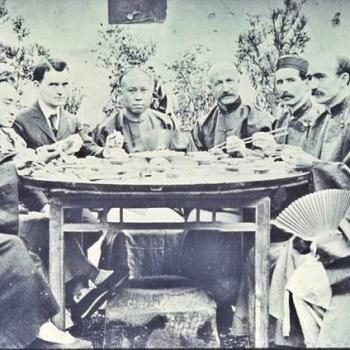I’ve had the privilege of participating in a book study group at Schole House, a center for Christian thought at VCU. As we’ve started this summer, one of the books we’ve decided to read through is C. S. Lewis’s classic volume, The Abolition of Man. In the first chapter (or essay) in the book, “Men Without Chests,” Lewis shares his concerns about what was starting to be taught in upper schools in England, particularly in his time. These invasive curricula and instructors turned their back on “the doctrine of objective value, the belief that certain attitudes are really ture, and others really false, to the kind of thing the universe is and the kind of things we are.” Lewis calls this widespread “way” of leaning “the Tao.” Instead, newer schools of thought were espousing what can essentially be called relativism. Lewis, in turn, worried the indoctrination or habituation of young people into these views would result in vice rather than virtue. Such teaching would remove the “organs” necessary for right living and believing.
One of my comrades at this study, a philosopher, was a bit skeptical about Lewis’s complaint. The danger he perceived was a yearning for a past “golden age,” a typical pitfall for the traditionalist. Just as importantly, older thinkers are not necessarily more correct. Plato, Aristotle, Confucius, Augustine, and others are wrong at several points. More importantly, he pointed out that relativism, deconstructivism, and otherwise rejection of the “Tao” has been around for a long time. After all, in the days of Socrates, Aristophanes, Plato, and Aristotle, there was a great concern over the Sophists, who received payment for teaching people—particularly the wealthy—to speak eloquently, win over crowds, and so forth without much concern for the true and the good.
This all reminded me of a similar conflict between St. Bernard and Peter Abelard. These were men who were both great in their own right. Bernard was likely the most famous Cistercian monk (and eventual abbot) that ever lived, wrote some of the most enduring classics in devotional and theological literature (including his On Loving God and commentary on the Song of Songs), had one of his own disciples elected pope, and wrote the Rule for the Knights Templar. One can easily discern in Bernard an ardent piety and even bellicose zeal.
Bernard was a product of the monastic schools of medieval Europe and believed that the goal of theology was devotion to God. Theology was not to be pursued merely for knowledge but for growth in the Christian life. However, monastic schools were not the only option for education. Soon, the cathedral schools and the later universities also grew in influence, and with them many schools of scholasticism began to arise. The scholastics taught and wrote using the dialectic method (logical arguments). This method involved a 3 step process: 1. Pose a problem in the form of a question, 2. Discuss the various aspects of a problem by exploring what certain authorities have said on the matter (Scripture, Church Fathers, Philosophers), and 3. Offer a synthesis or solution.
Abelard, on the other hand, was likely the most famous university lecturer in his day, specializing the logic. The product of the cathedral school at Notre Dame, apparently thousands of students flocked to hear his instruction. His predecessors, St. Augustine and St. Anselm, pursued theology on the principle of “faith seeking understanding” (I believe in order that I might understand). Abelard inverted this by proposing a theological method of doubt. He wrote, “It is by doubting that we come to enquire and by enquiring that we reach truth.” His major theological work was called Sic et Non (“Yes and No”). In this work, he posed a series of 158 theological questions. In these questions, he quoted a variety of ancient authorities (primarily Church Fathers), which did not agree with one another on certain topics. What made the work controversial was the fact that he completed the first 2 steps of the dialectic method but left off the third. In the book, he: 1. Posed theological questions, 2. Discussed the various views on the matter, but, 3. He did not offer a solution or synthesis. For theologians like Bernard, this was fairly dangerous: it shows the mechanics of dialectic for students to play around with, but Abelard did not put his own skin in the game by offering a solution. Arguably, to his detractors, he ignored the high and noble telos of theology in refusing to come down on one side or another for the sake of truth.
Obviously, the lives of Bernard and Abelard contrasted quite a bit. Bernard was given to militancy. Though it may seem odd for a monk who excelled in planting monasteries, Bernard was in fact a leading champion of the Second Crusade (which would go on to hurt his reputation when that crusade failed spectacularly). Abelard, on the other hand, fell to lust, carrying on a now-infamous affair with one of his students, Heloise. Although many great men (and not-so-great men) have had such moral failings, one cannot help thinking about St. Bernard’s striving for holiness in Christian devotion. Abelard may have had a great many exciting and even correct ideas, but Bernard lived out a life that was deeply—inseparably—intertwined with his scholarship.
Bernard and Abelard eventually came into direct conflict. The major problem that Bernard had with Abelard was over his view of the atonement (what Christ’s death achieved). Abelard was a founding proponent of the Moral Theory of Atonement, or at least he was one of its chief formulators and earliest vocal champions. This view holds that the purpose and work of Christ’s Incarnation and ministry was to bring about moral improvement to humanity. Virtue was the telos of the atonement. Abelard held this as the sole or at least main significance of the atonement. The Moral Theory is often the sole view of atonement accepted today by revisionist Christians, i.e. proponents of theological liberalism.
Bernard wrote,
I was made a sinner by deriving my being from Adam; I am made just by being washed in the blood of Christ. Shall generation by a sinner be sufficient to condemn me and shall not the blood of Christ be sufficient to justify me?…Such is the justice which man has obtained through the blood of the Redeemer. But this son of perdition [Abelard] disdains and scoffs at it…[Abelard believes that Christ lived and died] for no other purpose than that He might teach men how to live by His words and example and point them by His passion and death to what limits their love should go.
Anyone who has witnessed an argument between a traditional Protestant and a progressive one would notice a familiar script here.
Bernard arranged for Abelard to appear before a council at Sens in 1140 and his teachings were condemned. Abelard appealed to Pope Innocent II, but he concurred. To his credit, Abelard submitted to the decision and retired to the monastery of Cluny where he died 2 years later.
I would hardly call Abelard a Sophist. But some of the resemblances are fairly uncanny. Socrates was willing to be a martyr for philosophy (gadfly though he was); it is doubtful the Sophists had such a character (at least that we know of). Socrates did not pursue “devotion” in the sense of Bernard, but his studies and convictions took on flesh in his own life. Socrates, probably with the approval of Lewis, sought out the True and the Good, and he literally would put his life on the line for it. He used logical discourse, yes, but not simply used it: philosophy, the love of wisdom, was not a simple “subject” for analysis, but a way of being a human being. Discourse wasn’t simply to get things that one’s passions and appetites desired at the moment. It was not to find pleasure to flummoxing one’s intellectual opponents, as it was for the Sophists. It was not simply to exercise logic but rather sought an end: the Truth and the Good life. And to choose one answer and one way of being rather than the other was to risk oneself–one’s reputation, and perhaps even one’s life. In this Socrates and Bernard are similar.
For Socrates, discourse was necessary to accomplish or else fulfill the Good Life. After I left the meeting, I remembered this little interaction between Lewis and his Inkling friend Owen Barfield, which he recounted in Surprised by Joy. Lewis once referred to philosophy as a “subject.” Barfield quipped, “It wasn’t a subject to Plato. It was a way.”
Plato, Aristotle, Bernard, Lewis, and many other sages all see their study as part and parcel of a “way”; one attempts to live in conformity to the Truth (all the while seeking after it). The point of learning is to not simply deconstruct or discern the mechanics of logic, the natural world (cf. Francis Bacon), or anything else. Typically, when that is all education affords, students can simply see knowledge as a means to power or, more benignly, “self-realization.” The goal isn’t “smartness” or some kind of acquired intelligence; it is virtue. And out of this springs the so-called Great Tradition or Great Conversation, in which citizens of the canons of civilization act as spiritual fathers and guides to the student.
Moreover, “chest-less” education (however old it may be) does not include spiritual disciplines nor a concern for wonder at the Reality itself that engenders such piety. For Lewis and others like him, once a true, beautiful, or good thing has been discovered, it demands of its learner, “You must change your life.” As Proverbs teaches, wisdom has a moral dimension to it. And thus, Lewis and his fellow “Tao-followers” could complain that instructors who teach in this manner attacked in The Abolition of Man are guilty of “corrupting the youth,” to borrow an old accusation. It’s not that the youth are sinless and un-depraved; it is that teachers are sending them down a false path: one of error and vice, ending in destruction.
As Lewis himself says,
No justification of virtue will enable a man to be virtuous. Without the aid of trained emotions the intellect is powerless against the animal organism. I had sooner play cards against a man who was quite skeptical about ethics, but bred to believe that ‘a gentleman does not cheat’, than against an irreproachable moral philosopher who had been brought up among sharpers.
The Truth demands something of us and we have to live consistently in accordance with it. Yes, we can live inconsistently with our convictions, but the issue is aligning one’s life consistently and developing the spirit or “chest” of the person to bring one’s body and passions under subjection to the Truth. I think a lot of that has to do with the affections (as Jonathan Edwards might talk about them). Tied to that is the “hidden curriculum” of any institution of learning, which goes a long way in forming the character of students and teachers alike.
Yet I think there are others who do not believe, act, or think that way. Relativists can live in contradiction to their actual (monstrously vicious, at least according to Lewis) ethical beliefs (I think that Sophists, Abelard, and many, many folks today are this way), while there are others that hold to pristine, non-relativistic ethical views who are monsters. Lewis’ wonderful example of the card players addresses this. Meanwhile, “Way-followers” want both: right convictions and also right living, and they also believe that there isn’t an impermeable wall that can reside between these two: they’ll spill into one another at various points: belief into life, and life into belief.
I don’t like creating big polarities or bifurcations in history. And I’m sure there are noted thinkers that could fall into neither or both camps. But I can’t help nodding my head in agreement with Lewis that he is a part of a certain body of sages who devoted themselves to a fairly universal project, and there have been other thinkers to take exception to, ignore, or even attack that project. Madeleine L’Engle observed this in her book A Wrinkle in Time. I may be crazy, and my intellectual history might be off the mark. But if I’m not completely wrong in discerning this pedagogical contest–this strife over instruction–I know which of those two teams I’m on.
(My gratitude extends to Cn. Charles Camlin and the Rev. Jonathan Kell—a good bit of my writing hear about church history was derived from notes culled from their lectures).














